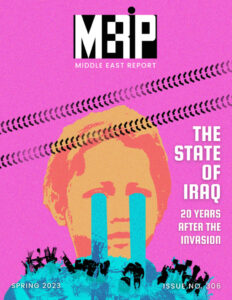 In April 2023, Middle East Report [MERIP] Issue #306, “The State of Iraq: 20 Years After the Invasion,” was officially published. UMW Professor of Middle Eastern History Nabil Al-Tikriti joined the team of developers and editors who invited contributors and edited content for the issue, available online.
In April 2023, Middle East Report [MERIP] Issue #306, “The State of Iraq: 20 Years After the Invasion,” was officially published. UMW Professor of Middle Eastern History Nabil Al-Tikriti joined the team of developers and editors who invited contributors and edited content for the issue, available online.
The Issue Development Team (IDT) consisted of Profs. Nabil Al-Tikriti, Lisa Hajjar of UC-Santa Barbara, Shamiran Mako of Boston University, and Marsin Alshamary of the Brookings Institution. Marya Hannun is MERIP’s managing editor and oversaw the overall editorial process.
Press Release: “MER issue 306, The State of Iraq—20 Years After the Invasion, begins with the assertion that the anniversary is not a single event but part of an ongoing story. At the center are “the state of Iraq” and the reality in which Iraqis live today. The contributions analyze state-society relations, untangle political dynamics and follow flows of capital and power as they lay bare the enduring legacy of the 2003 invasion, occupation and “reconstruction.” With chilling precision, pieces explore the social, political, economic, cultural, spatial and environmental landscape of today’s Iraq. They make clear the structural effects of war as well as its human toll. At the same time, the essays invite readers to look toward the future, with hope and caution. This issue also marks the beginning of a collaboration between MERIP and Jummar, an independent Iraqi media initiative whose work promotes new voices from Iraq and brings English-language knowledge of Iraq into Arabic. Jummar has translated articles from the issue, and Jummar’s designer, the Baghdad-based visual artist Atef Al Jaffal, designed the cover: Iraq’s Crying Child. ”
In addition to participating on the IDT, on April 4 Al-Tikriti joined with Profs. Hajjar, Mako, Alshamary, and Dr. Haider Ala Hamoudi of the University of Pittsburgh Law School to discuss the issue’s findings at a Boston University sponsored webinar:
Contributions to the issue included: Fanar Haddad, “Perpetual Protest and the Failure of the Post-2003 Iraqi State,” Zahra Ali, “Iraqi Women’s Activism — 20 Years After the US Invasion,” Zeinab Shukur, “Water, Oil, and Iraq’s Climate Future,” Hamzeh Hadad, “Two Decades of Uneven Federalism in Iraq,” Bilal Wahab, “The Rise and Fall of Kurdish Power in Iraq,” Renad Mansour, “The Political Logic Behind Iraq’s Fragmented Armed Forces,” and Hannibal Travis, “Perspective — Recognizing and Repairing the Harm to Iraq’s Minority Communities.” The issue also includes “Interview — The Past, Present, and Future of Iraq’s Cultural Heritage” with Mark Altaweel, Jaafar Jotheri, and Hannah Parsons-Morgan.
Dr. Al-Tikriti thanks everyone involved in the completion and publication of this MERIP issue, which marks the end of his six year term serving on MERIP’s Editorial Committee. In the course of those six years, Dr. Al-Tikriti served on five Issue Development Teams.
Middle East Report is published by the Middle East Research and Information Project (MERIP), a progressive, independent organization. Since 1971 MERIP has provided critical analysis of the Middle East, focusing on political economy, popular struggles and the implications of U.S. foreign policy for the region.